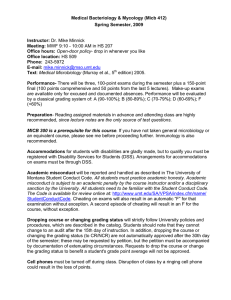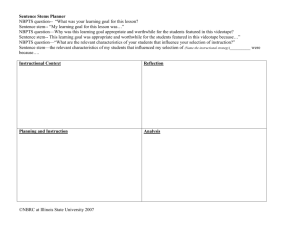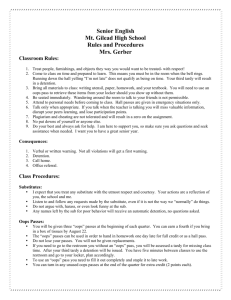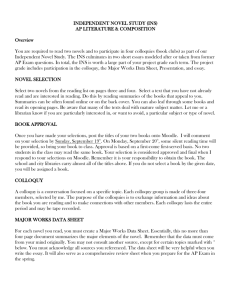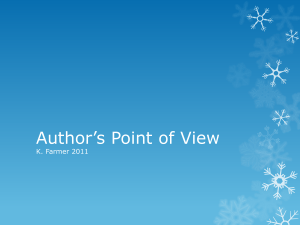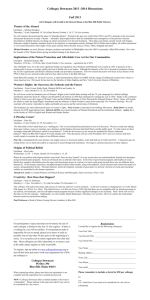660 Syllabus - The Portfolio of Kara Smith
advertisement
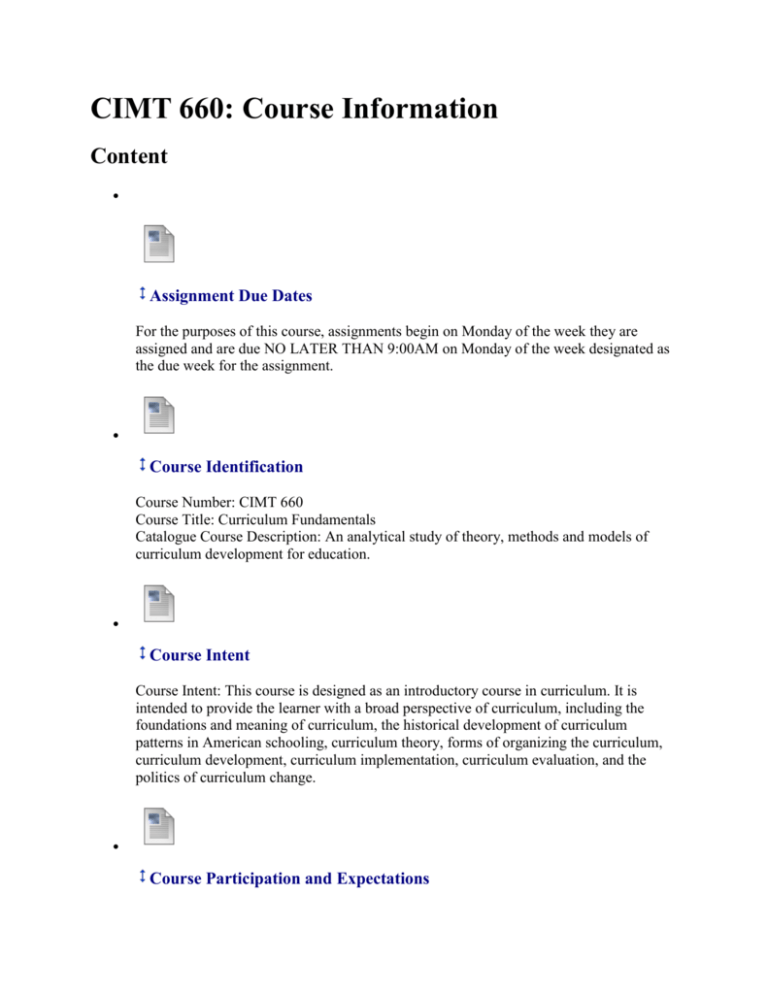
CIMT 660: Course Information Content Assignment Due Dates For the purposes of this course, assignments begin on Monday of the week they are assigned and are due NO LATER THAN 9:00AM on Monday of the week designated as the due week for the assignment. Course Identification Course Number: CIMT 660 Course Title: Curriculum Fundamentals Catalogue Course Description: An analytical study of theory, methods and models of curriculum development for education. Course Intent Course Intent: This course is designed as an introductory course in curriculum. It is intended to provide the learner with a broad perspective of curriculum, including the foundations and meaning of curriculum, the historical development of curriculum patterns in American schooling, curriculum theory, forms of organizing the curriculum, curriculum development, curriculum implementation, curriculum evaluation, and the politics of curriculum change. Course Participation and Expectations Course Participation and Expectations: This course requires students to consistently participate in the course activities and assignments, including electronic discussions, on a scheduled basis. It is imperative that all assignments are completed on time. Failure to attend to the sequence of course activities and assignments will result in a lower grade. The schedule for course assignments is noted in the course calendar. Please make every effort to adhere to all deadlines. Scholastic Integrity Scholastic Integrity: Students are expected to be above reproach in scholastic activities. Students who violate University rules on scholastic dishonesty are subject to disciplinary penalties, including the possibility of failure in the course and dismissal from the University. Since scholastic dishonesty harms the individual, all students and the integrity of the University, policies on scholastic dishonesty will be strictly enforced. Be sure to cite sources in the body of the text of your written materials, giving credit to the source of the ideas you are using. Avoid paraphrasing. Cite specific page numbers when using a direct quotation. The accepted format for formal papers in education is found in the APA Publications Manual, 5th edition. Course Objectives Students, at the successful conclusion of the course, will be able to: 1. Discuss various interpretations of "curriculum" and their organizational implications for American public schooling. [NBPTS 2.1, 4.2, 5.1] 2. Identify the significant curricular movements throughout the history of American public schooling. [NBPTS 5.1] 3. State the underlying philosophical perspectives on current curricular movements in American public schooling. [NBPTS 5.1] 4. Explain the role of curriculum theorizing in American public schools from both a historical and current curriculum perspective. [NBPTS 2.1, 4.2, 5.1] 5. Identify factors influencing curriculum in American public schools. [NBPTS 5.1] 6. Compare and contrast various significant curricular models appropriate for American public schools for their similarities and/or differences. [NBPTS 2.1, 4.2, 5.1] 7. Articulate the several approaches to curriculum development and implementation in American public schools. [NBPTS 5.1] 8. Explain several approaches to curriculum evaluation appropriate for American public schools. [NBPTS 5.1] 9. Formulate their own personal practical theory of curriculum and be able to explain the basis for their theory and the implications of their theory for development and implementation in American public schools. [NBPTS 2.1, 4.2, 5.1] Colloquy Colloquy is defined as "a conversational exchange; dialogue; a conference." Since we do not meet face-to-face for this course the use of electronic dialogue through the colloquy is designed to give you contact with your peers in this course, provide you an opportunity to interact with your peers and instructor around curricular concerns and questions, and give you an opportunity to demonstrate your emerging knowledge of curriculum. There are four colloquies scheduled for the course. These occur through the electronic discussion board (accessed under "Discussion Board" on the left-hand navigation bar). These colloquies are scheduled under the "Course Calendar" found under "Course Information". Each colloquy spans a one-week period. Within that week, you are required to: 1. Post an initial comment to the colloquy question AND 2. Respond to a peer's comment(s) about the colloquy question. [Please note that you are not confined to only one response. The idea behind this aspect of the course is to provide you a chance to talk about curricular issues that you are reading and studying.] 3. Include in your second response a brief summarization of your point of view about the colloquy question. OR 1. You may make two responses to one or more initial comments by your peers. 2. Include in one of these responses a brief summarization of your point of view about the colloquy question. The colloquy questions will be posted by your instructor and all colloquys are posted so that students can see future discussion topics. Your initial posting and responses should follow the schedule listed below: 1. Your initial posting should be made by Wednesday morning at 9:00 am of the colloquy week 2. Your final response/summarization should be made no later than 9 am Monday of the following week (this is a final deadline for summation points). There is a certain decorum that is expected of all members of the class in relation to electronic messages. Since we are not physically visible to each other it is important to remember that irony and humor do not readily come across as they may be intended. As well, for our purposes, your electronic messages MUST confine themselves to discussion, debate, and even disagreement ON THE POINTS UNDER DISCUSSION. You are not to engage in PERSONAL ATTACKS through the colloquy. In that vein, re-read your responses again before you hit the "send" button.I have absolutely NO toleration for personal attacks and will deal with these in an appropriate manner. REMINDER: The "Oops!" pass may not be applied to the Colloquy. Oops! All of us forget things. That's part of human nature and the hectic lives that we all lead. So, to help alleviate your stress if (when?) you forget something for this class you have three "Oops!" passes. An "Oops!" pass will provide you with an additional 48 hours to complete an assignment, no questions asked. However, you must send me your "Oops!" PRIOR to when the assignment is due. Please note that "Oops!" passes are not valid AFTER the due date for an assignment. Please send your "Oops!" request to your instructor directly by email (no telephone calls for "Oops!" please). "Oops!" passes cannot be used to extend the length of the semester. Regardless of the number of passes you have used during the semester, you may not use an "Oops!" pass to push the due date of the final project past the first day of scheduled finals at the university (generally Monday). The university has strict time limits for grade submission and because your instructor will need sufficient time to grade your project and submit your grade, later submissions will not be an option. "Oops!" passes are good for all assignments EXCEPT the final project and the Colloquy (this exception is because Colloquy is a group activity rather than your other assignments which are individual). That means you can use your three "Oops!" passes for any of your performance projects EXCEPT for the final. Remember, you have three passes during the session. Make good use of them!
